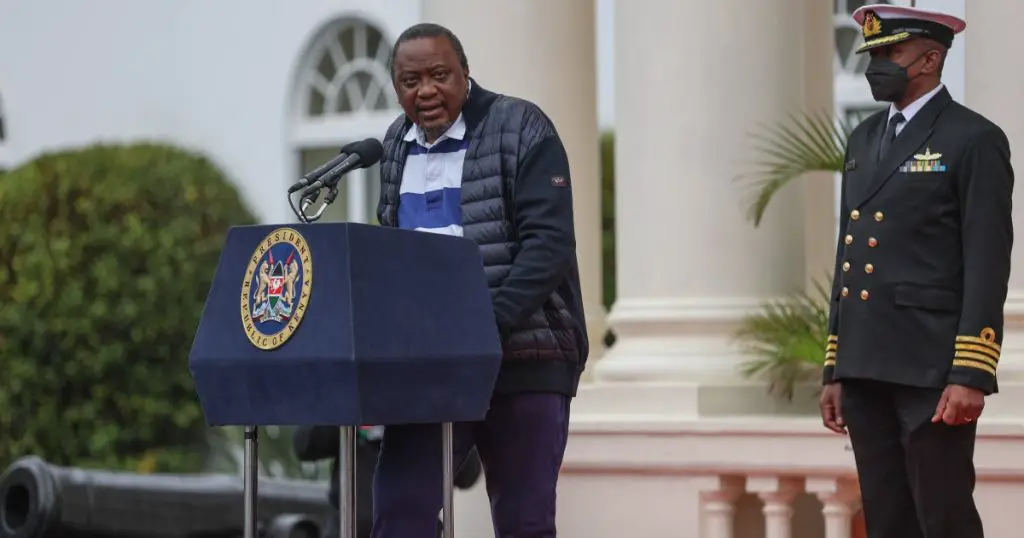- President Uhuru Kenyatta has established a government agency whose work will be to ensure access to the safe and ethical use of human cells, tissues and organs in Kenya
- Kenyatta established the Kenya tissue and transplant authority through a special gazette notice dated August 1st
- The Kenya tissue and transplant authority will be a successor to the National Blood Transfusion, Tissue and Human Organ Transplant Services Department
President Uhuru Kenyatta has established a government agency whose work will be to ensure access to the safe and ethical use of human cells, tissues and organs in Kenya.
On August 4, 2022, Kenyatta launched the Kenya tissue and transplant authority, through a special gazette notice dated August 1st.
The authority will be a successor to the Department of the National Blood Transfusion, Tissue and Human Organ Transplant Services.
It will be required to ensure the safety, biosafety and wellbeing of donors and recipients in medical services relating to human-derived medical products through establishing and maintaining systems that comply with safety and legal requirements.
The authority will be tasked with regulating all services relating to human cells, tissue and organ transplant under the Health Act, 2017, register and licensing facilities and establishments dealing with human cells, tissues and organs and transplant services, maintain a registry of transplant service providers, donors and recipients as well as establish an equitable mechanism for matching and allocation of cells, tissue and organs.
“It will also oversee the implementation of policies, guidelines, procedures and standards relating to human tissues and organs, and provide support services for transfusion and transplant systems,” the gazette said.
This includes testing, grouping, typing, banking, processing, distribution, manufacturing and quality control, and develop a national emergency response mechanism including maintenance of strategic reserves for human tissues and organs, mobilise, educate and sensitise members of the public to foster voluntary donations of cells, tissues and organs and collaborate with other established organ exchange organizations in other countries, for the exchange of tissue and organs.
East African Community organs urged to fast track integration
Other functions include conducting and collaborating with other stakeholders in conducting research on human cells, tissues and organs and related services, advising the health Cabinet Secretary, National and County Governments and all stakeholders on ethical, legal and clinical issues related to services for human cells, tissue and organ transplant and such other functions as the Board, with the approval of the Cabinet Secretary, may determine.
In discharging its mandate, the authority has been given powers to establish and maintain linkages with relevant regulatory and service bodies on matters related to cells, tissues and human organ medical services.
It will also make and enforce directions to ensure compliance, inspect hospitals periodically for examination of the quality of transplantation and the follow-up medical care to persons who have undergone transplantation and persons from whom organs are removed.
It may also summon any person who owns any information relating to violations, enter, search and inspect any place suspected to be indulging in unauthorised removal, procurement or transplantation of human cells, organs or tissues or order the production of any document or material object suspected to be used in relation to unauthorised removal, procurement or transplantation of human cells, organs or tissues.
The authority will have a board comprising a non-executive Chairperson appointed by the President, the Principal Secretary in the Ministry of Health responsible for finance, or his or her representative, appointed in writing.
It will also include the Attorney-General or his representative, appointed in writing, one person, not being a governor, nominated by the Council of Governors, three other members, not being public officers, appointed by the Cabinet Secretary by virtue of gender, disability, regional balance and their knowledge and experience in matters relating to haematology, pathology, transplant medicine, finance, management, economics, law or any other relevant field. The chief executive officer will be an ex-officio member of the Board.
The formation of the authority comes amid increased investments in modern blood processing, storing, testing equipment, access to safe organs and transplantation services and distribution mechanisms across the Country.
In order to institutionalize and safeguard the gains made, Kenya has developed the Kenya Policy on Donations, Transfusion and Transplant of Human derived medical products, the first integrated policy on blood, cells, tissues and organs in Eastern, Central and Southern Africa.
To address the challenge of obsolete equipment and resources in the management blood, cells, tissues and organs, the ministry of health has invested in digitising health by leveraging technology with the recent launch of the Kenya Blood Banking Information System– Damu-KE.
The system ensures efficiency and security of related products and in building capacity for the health system to respond to critical needs. The system has been deployed to all Regional Blood Transfusion Centres and to county-based satellites and is operational in the National referral hospitals.
East African Parliament on the spotlight over irregular emoluments
